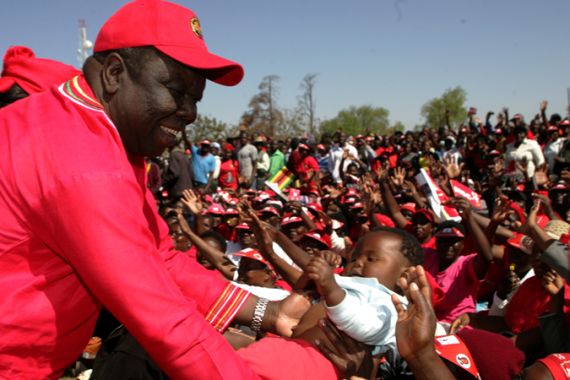Zimbabwe opposition leader Morgan Tsvangirai
Zimbabwe opposition leader and former prime minister Morgan Tsvangirai passed away on Wednesday.

Morgan Tsvangirai, Zimbabwe’s former prime minister, was no stranger to tough times – both inside and outside of politics.
The 65-year-old opposition leader passed away on Wednesday after a long battle with colon cancer, officials from within his Movement for Democratic Change (MDC) party said.
Keep reading
list of 4 itemsRussia-Ukraine war: List of key events, day 785
US imposes new sanctions on Iran after attack on Israel
German far-right politician on trial for alleged use of banned Nazi slogan
“We mourn the sad passing on of an indefatigable fighter for peaceful democratic change in Zimbabwe,” said Obert Gutu, MDC’s national spokesperson.
Gutu described Tsvangirai as “a political icon” and “a humble and tenacious fighter for the creation of a peaceful, stable, democratic and progressive nation-state in Zimbabwe”.
Humble beginnings
Born in 1952 to a bricklayer father in drought-prone Buhera, in the southeast of Zimbabwe, Tsvangirai prematurely ended his studies at Gokomere Mission to support his siblings.
The eldest of nine children, Tsvangirai worked at a textile mill in Mutare in the country’s east, and later joined a nickel mine in Bindura, a town in the north.
After Zimbabwe gained independence from Britain in 1980, Tsvangirai became branch chairman of the National Mine Workers Union, rising through the ranks to become secretary-general of the Zimbabwe Congress of Trade Unions (ZCTU) in 1988.
Under his leadership, the labour federation challenged economic policies and a lack of democracy in the 1990s in Zimbabwe.
In well-coordinated and crippling national strikes, workers staged street protests against meagre salaries, rising inflation, rampant corruption and deepening poverty.
He relinquished that post, however, when he formed the MDC in 1999.
Symbol of resistance
A year earlier, in 1998, Tsvangirai became chairman of the National Constitutional Assembly, a position largely seen as recognition for his leadership.
His political career had been steadily rising, as he became a household name and a symbol of resistance.
When hired men unsuccessfully tried to throw him from the 9th floor of his Chester House office in central Harare, the capital, in December 1998, Zimbabwean workers spontaneously laid down their tools.
Tsvangirai had six children with his late wife Susan, who died in a 2009 car accident.
But his personal life had become a source of some embarrassment for the political leader.
In September 2013, he wed businesswoman Elizabeth Macheka, 36, but did not sign the legal marriage register due to a legal challenge filed against their union by the PM’s ex-lover, Locardia Karimatsenga.
Former Zimbabwean President Robert Mugabe, who stepped down in November last year, had campaigned against Tsvangirai’s alleged “immorality”, saying he was not fit to be president.
But his relentless push for democratic change won Tsvangirai several awards, including an honorary doctorate of Laws from Pai Chai University in South Korea and Solidar Silver Rose award.
Tsvangirai emerged as a powerful public speaker and opposition leader, organising protests to try to push Mugabe out. Throughout his life, he was jailed several times, charged with treason, and labelled a traitor by Mugabe supporters.
Challenge to Mugabe
In 2008 presidential elections, Tsvangirai was the main challenger to Mugabe and the longtime president’s ZANU-PF party.
Tsvangirai secured 47 percent of the vote in the first round, compared with Mugabe’s 43 percent. But because his victory fell short of the threshold needed to avoid a second round, a runoff was organised.
Mugabe ended up being the sole candidate in that round, however, after Tsvangirai boycotted the vote due to a campaign of intimidation, harassment and violence against his supporters.
Despite his boycott, Tsvangirai eventually joined a unity government formed in 2009 and served as prime minister in what was a temporary, power-sharing government with Mugabe at the helm.
In 2013, Tsvangirai described the years since the coalition government took office as “a painful transition characterised by the absence of a genuine partner”.
That same year, Tsvangirai and the MDC lost presidential elections by a large margin.
Al Jazeera’s Haru Mutasa reported that Tsvangirai’s critics at the time accused him of ignoring the plight of the poor. Allegations of party in-fighting and corruption also tarnished his image and some of his closest allies left the party.
But in 2017, a coalition was formed to challenge Mugabe’s grip on power and Tsvangirai once again was believed by many to pose a significant test for the former president.
‘Huge loss’
Mutasa reported that there is “a huge sense of loss” among Tsvangirai’s supporters, ” who say they will remember him for all the good things he did”.
“He made mistakes, everyone does, but they’re saying, for now, it’s about remembering him, remembering his legacy, and of course wondering where this takes the MDC opposition party,” she said.
The future of the MDC party, meanwhile, remains an open question.
As Tsvangirai’s health worsened, the party has become increasingly divided along factional lines, with several politicians jostling to lead in advance of expected presidential elections in Zimbabwe later this year.
“That’s going to be one big thing to watch,” Mutasa said, “how quickly can they unite to challenge the ruling ZANU-PF party and President Emmerson Mnangagwa“, who took over as president after Mugabe was deposed last November.